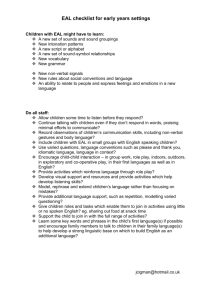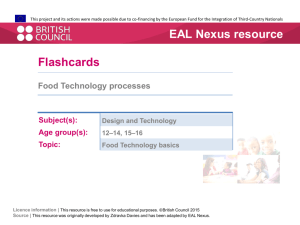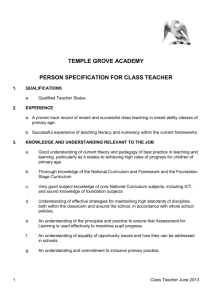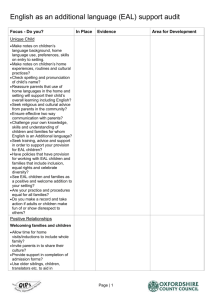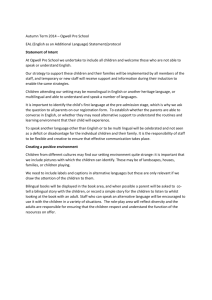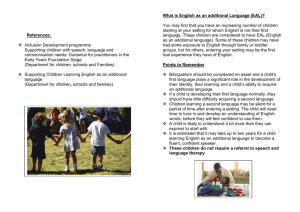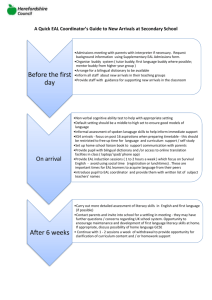English as an Additional Language Policy
advertisement
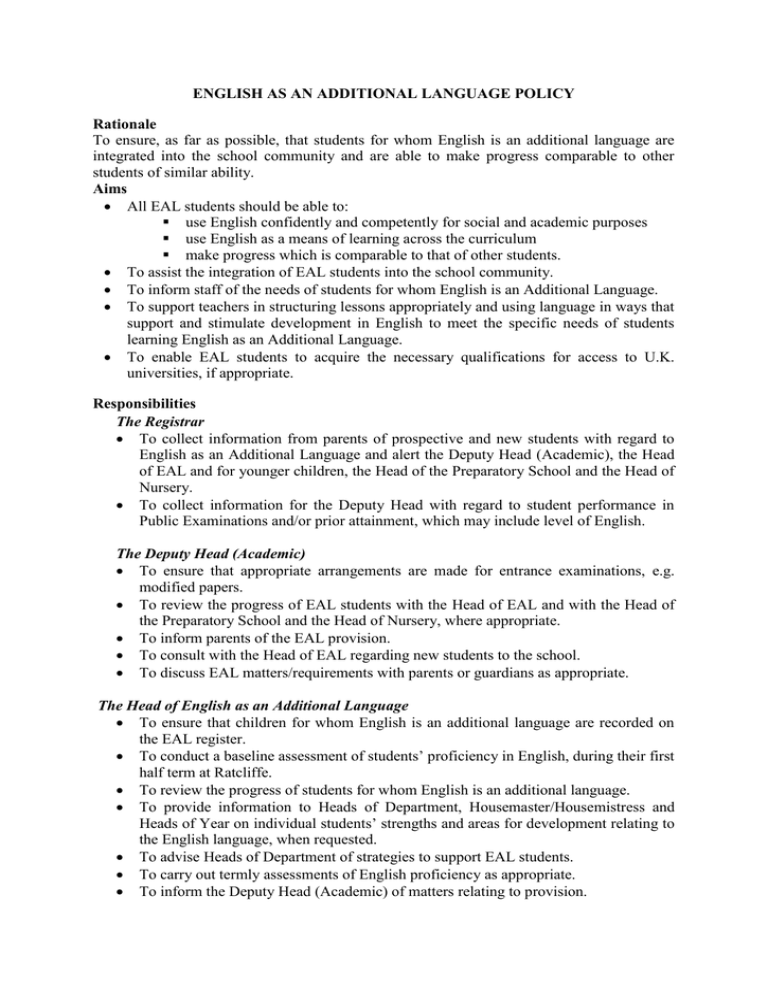
ENGLISH AS AN ADDITIONAL LANGUAGE POLICY Rationale To ensure, as far as possible, that students for whom English is an additional language are integrated into the school community and are able to make progress comparable to other students of similar ability. Aims All EAL students should be able to: use English confidently and competently for social and academic purposes use English as a means of learning across the curriculum make progress which is comparable to that of other students. To assist the integration of EAL students into the school community. To inform staff of the needs of students for whom English is an Additional Language. To support teachers in structuring lessons appropriately and using language in ways that support and stimulate development in English to meet the specific needs of students learning English as an Additional Language. To enable EAL students to acquire the necessary qualifications for access to U.K. universities, if appropriate. Responsibilities The Registrar To collect information from parents of prospective and new students with regard to English as an Additional Language and alert the Deputy Head (Academic), the Head of EAL and for younger children, the Head of the Preparatory School and the Head of Nursery. To collect information for the Deputy Head with regard to student performance in Public Examinations and/or prior attainment, which may include level of English. The Deputy Head (Academic) To ensure that appropriate arrangements are made for entrance examinations, e.g. modified papers. To review the progress of EAL students with the Head of EAL and with the Head of the Preparatory School and the Head of Nursery, where appropriate. To inform parents of the EAL provision. To consult with the Head of EAL regarding new students to the school. To discuss EAL matters/requirements with parents or guardians as appropriate. The Head of English as an Additional Language To ensure that children for whom English is an additional language are recorded on the EAL register. To conduct a baseline assessment of students’ proficiency in English, during their first half term at Ratcliffe. To review the progress of students for whom English is an additional language. To provide information to Heads of Department, Housemaster/Housemistress and Heads of Year on individual students’ strengths and areas for development relating to the English language, when requested. To advise Heads of Department of strategies to support EAL students. To carry out termly assessments of English proficiency as appropriate. To inform the Deputy Head (Academic) of matters relating to provision. To make referrals to the SENCo of EAL students for assessment of special educational needs where the student is not making the expected progress. To liaise with the Examinations Officer about entry to Public Examinations for EAL qualifications. To liaise with the Examinations Officer regarding access arrangements as stipulated in the JCQ documentation. The Examinations Officer will thereby ensure that appropriate arrangements are made where students are entitled to concessions for Public Examinations. To monitor the effectiveness of overall provision. To liaise with the Head of Nursery and the SEND co-ordinator of the Preparatory School to ensure that younger EAL pupils’ needs are identified and supported. Heads of Department To ensure that matters regarding students for whom English is an additional language are on departmental agendas at least once every half-term. To ensure that the department has a policy for supporting students for whom English is an additional language. To ensure that a new teacher is briefed regarding any child being taught for whom English is an additional language, where there are changes of teacher within an academic year. To make the Head of EAL aware of students who appear not to be making the expected progress and of the strategies, which are being implemented within the department to address the situation, using the EAL referral form (Purple Sheet) (Appendix 1) or via email. To provide subject teachers with information regarding EAL students. To advise subject teachers on strategies to support EAL students. To monitor the progress of EAL students. Subject teachers To appreciate that all teachers contribute to the teaching of effective spoken and written English, which should be embedded in the teaching and learning of subject content. To familiarise themselves with the information on the EAL register and to record (in whatever way is most appropriate) those students they teach for whom English is an additional language. To ensure that students are supported in the use and understanding of subject specific vocabulary. To ensure that differentiation is used, as appropriate, and in line with the departmental policy, in order to allow children for whom English is an additional language greater access to subject matter. To follow the suggested strategies, where possible, indicated on the ‘purple’ individual student profile sheets. To discuss with Heads of Department any child causing concern due to a lack of expected progress. The Senior Deputy Head To ensure that issues regarding EAL are on the agenda for the Pastoral meeting at least once every half-term. To ensure that Housemaster/Housemistress and Heads of Year monitor the progress of students for whom English is an additional language from the pastoral perspective, especially in terms of integration into the school community. To review the progress of students for whom English is an additional language. To consult with the Head of EAL regarding referrals as appropriate. Housemaster/Housemistress & Heads of Year To familiarise themselves with the information on the EAL register and to record (in whatever way is most appropriate) those students for whom English is an additional language. To monitor the progress of students. To advise tutors of strategies to support the progress of students for whom English is an additional language, from the pastoral perspective. To support the integration of boarders into the boarding community. To encourage participation in extra-curricular activities at evenings and weekends. To refer to the Head of EAL students who are causing concern. Form Tutors To familiarise themselves with the information on the EAL register and to record (in whatever way is most appropriate) those students in their tutor group for whom English is an additional language. To use feedback from subject teachers to monitor progress and inform consultation with Heads of Year wherever there are concerns. To be pro-active in encouraging the progress of students for whom they have a pastoral responsibility, especially in terms of integration into the school community. To encourage participation in extra-curricular activities. Implementation: Students for whom English is an additional language will no longer be asked to sit an entrance examination in English. They will now have to provide a valid IELTS or ESOL (Cambridge English Language Assessment) examination certificate. The English requirements for entry are as follows: External Examinat ions IELTS ESOL testing 6th form entry IELTS 5.5 Nothing less than 5 in an individual skill. Cambridge First Certificate in English (pass ) Years 10-11 Entry Years 9 Entry Years 8 Entry Years 7 Entry IELTS 5 Nothing less than 4 in any individual skill. N/A N/A N/A Cambridge Preliminary English Test (A or B pass) Cambridge Preliminary English Test (C or better) Cambridge Key English Test (B Grade or better). Cambridge Key English Test (C grade or better). Students undergo a baseline assessment of their proficiency in English in their first half term. A detailed register of all EAL students is kept which includes categorisation of the students’ ability based on the four skills of Reading, Writing, Speaking and Listening. Attached to this register are general strategies for supporting a student within each category. This register is published on the Staff Shared Area; students receiving specialist provision are highlighted on this list. Assessment reports are circulated to Heads of Year, Housemaster/Housemistress, student file and the teacher in charge of EAL. Assessment of English proficiency is carried out each term, or as appropriate. A copy of all school reports and studies assessments or target sheets (Preparatory School), for EAL students is given to the teacher in charge of EAL or accessed via SIMS, as appropriate. Progress of EAL students is monitored through a review of studies assessments, examination results and school reports, as well as through progress made within EAL lessons. EAL students receive support through curriculum subjects to develop the four skills (Reading, Writing, Speaking and Listening). EAL pupils in the Nursery are supported when they choose to use their home language at school either in lessons or in free play. Specialist tuition is offered to students in Years 7-13, as part of the boarding fee. Students can opt to take EAL in place of the subjects listed below, or lessons will be arranged in non-contact time so that all students have access to the full National Curriculum. Year Group Provision Year 7 Year 8 Year 9 Year 10 Year 11 Year 12 & 13 EAL lessons replace French EAL lessons replace French EAL lessons replace French EAL appears in the Modern Foreign Language block EAL appears in the Modern Foreign Language block EAL lessons take place during students non-contact time No of lessons per fortnight. 4 4 3 5 5 4 The decision to offer an amended curriculum follows discussion between the Deputy Head (Academic), the Head of EAL and consultation with parents. Arrangements for the provision of language support for an individual are reviewed at least annually by the Head of EAL and the Head of English; changes at any other times are made following reports or studies grades. All departments have a written policy on how they support the specific needs of students for whom English is an additional language. A list of keywords, for each main topic, in every year group, is provided by each department. The effectiveness of overall provision is monitored through a regular review of samples of students’ work and discussion with the students. A review of individual studies grades and reports also provides information in this respect. In Year 10 and 11, the focus of EAL lessons is to support their progress in their GCSE subjects, but in particular English, to help the students obtain the much needed ‘C’ grade. All EAL students have the opportunity and choice to sit an external Cambridge ESOL exam in May. The student is entered at the level for which they are deemed to be proficient. The students follow the appropriate examination course throughout the year: o Year 7 students follow the Key English Test (KET) course. Students are only entered if it is felt they are ready for the examination. If they are not, consideration is given for entry to the next examination session. o In Year 8 and 9 the Preliminary English Test (PET) course is followed. At the end of Year 8, there is the chance of re-taking the KET examination or taking the PET examination. At the end of Year 9, students can re-take the PET examination or be entered for the first time. Again students are entered only if they are at the correct proficiency level. In Year 9, the FCE course is introduced to those who have obtained the PET qualification. This is achieved by differentiation of work. o In Year 10 the First Certificate in English (FCE) course is followed. o In Year 11 the Cambridge Advanced English (CAE) course is followed, if students have advanced sufficiently. o In Year 12 the IELTS preparation course is followed or the CAE course is continued. Most foreign students, for whom English is an additional language, wanting to attend an English University, need to obtain an IELTS or CAE qualification. o Year 13 students have the opportunity of re-taking the IELTS exam, if necessary. Otherwise, a course in English for specific use is offered according to demand (for example, English for Business, English for Hotel Management, and so on). Each student has an individual interview with the teacher in charge of EAL once a term. Students’ work and progress will be discussed in these sessions. A Development Plan is produced annually. Monitoring The Deputy Head (Academic) and the Head of EAL are responsible for monitoring the implementation of the policy through discussion with students and sampling their work, and with Heads of Department. Links to Other Policies Assessment Policy Boarding Policy Curriculum Policy Differentiation Policy Equal Opportunities Policy Pastoral Care Policy Reporting Policy School Development Plan Special Educational Needs Policy Details of this policy are published in the Senior School Information Handbook for parents. Review The English as an Additional Language Policy is reviewed annually by the Head of EAL. Latest review – This policy was last reviewed by the Head of EAL, Academic Deputy Head and Head of Preparatory School, October 2015
